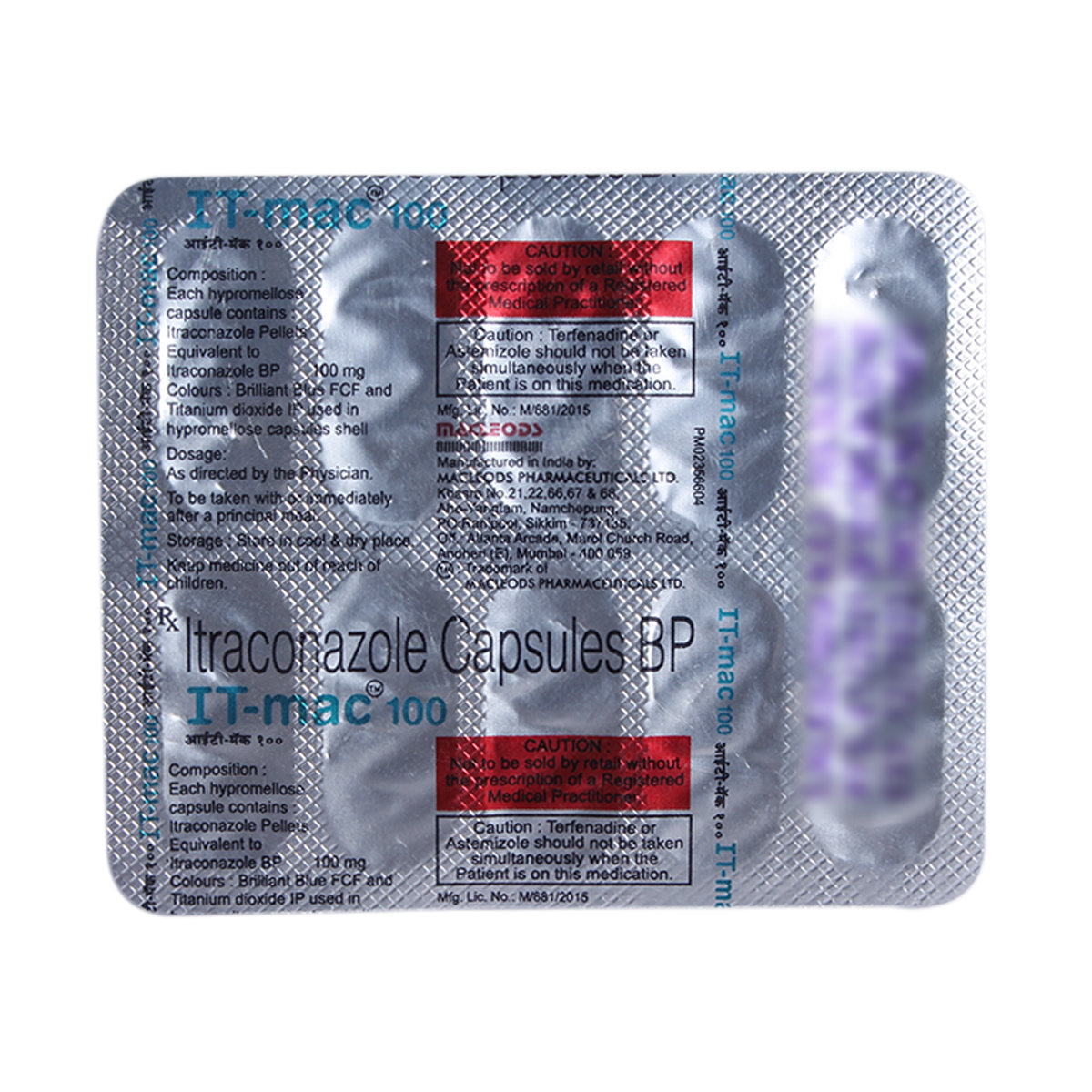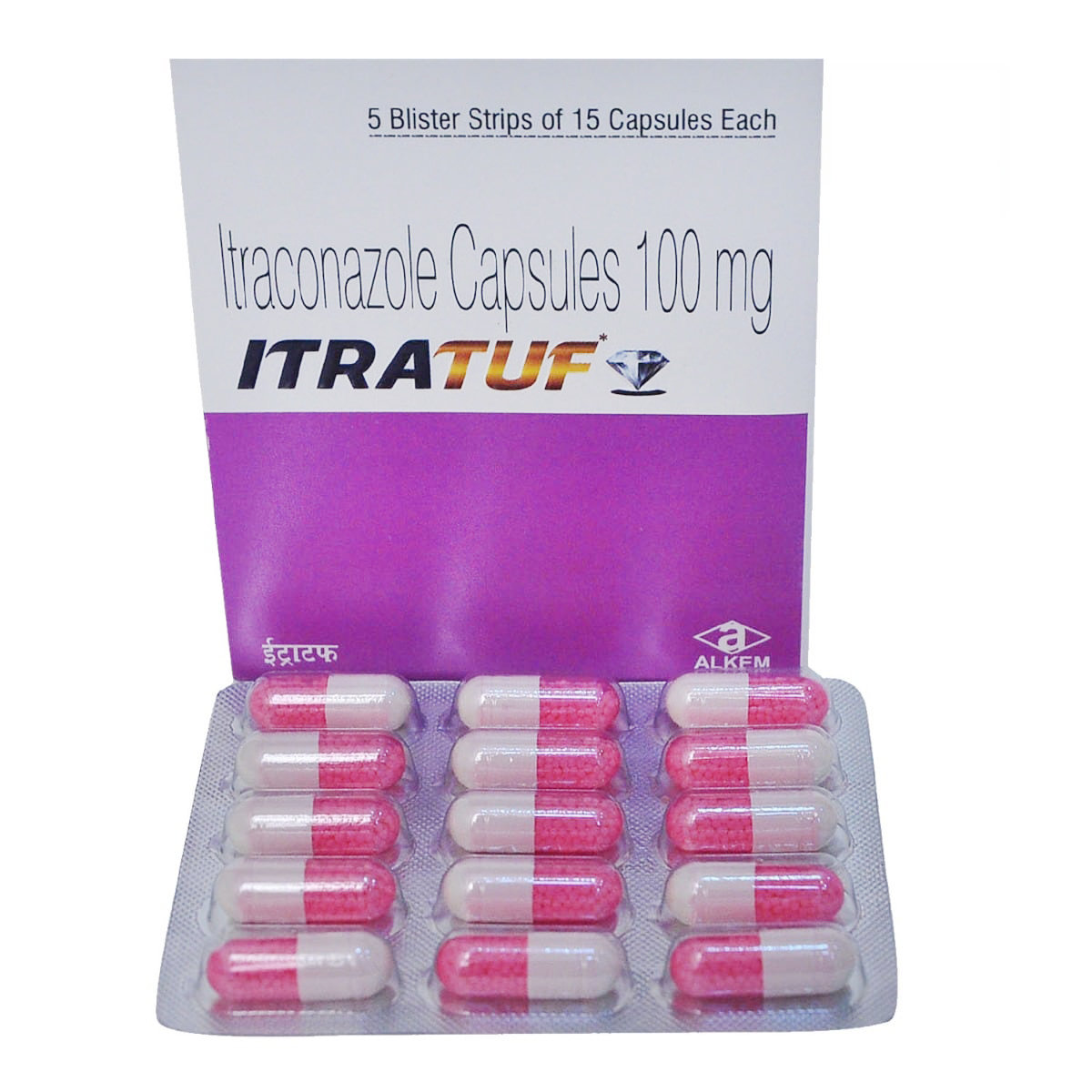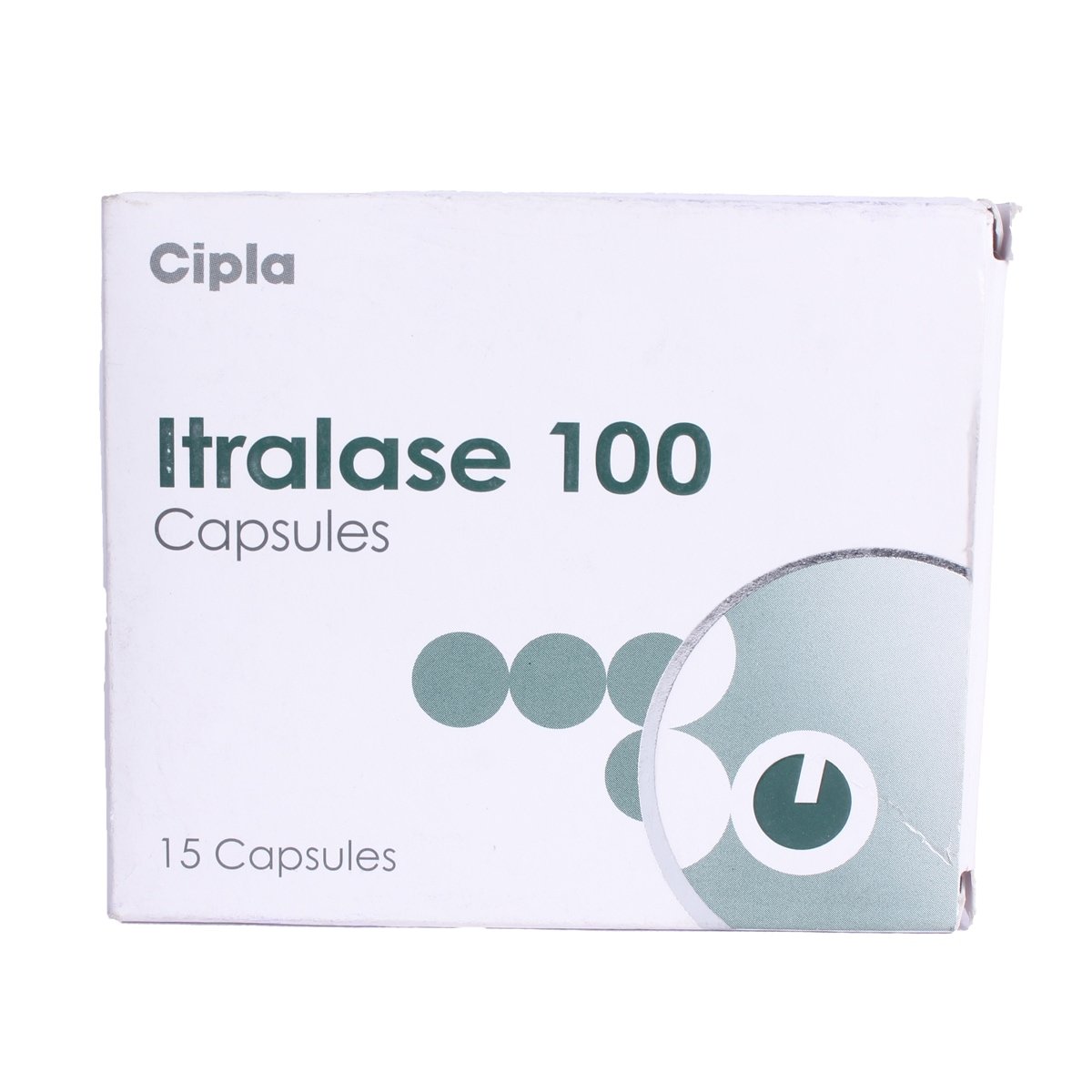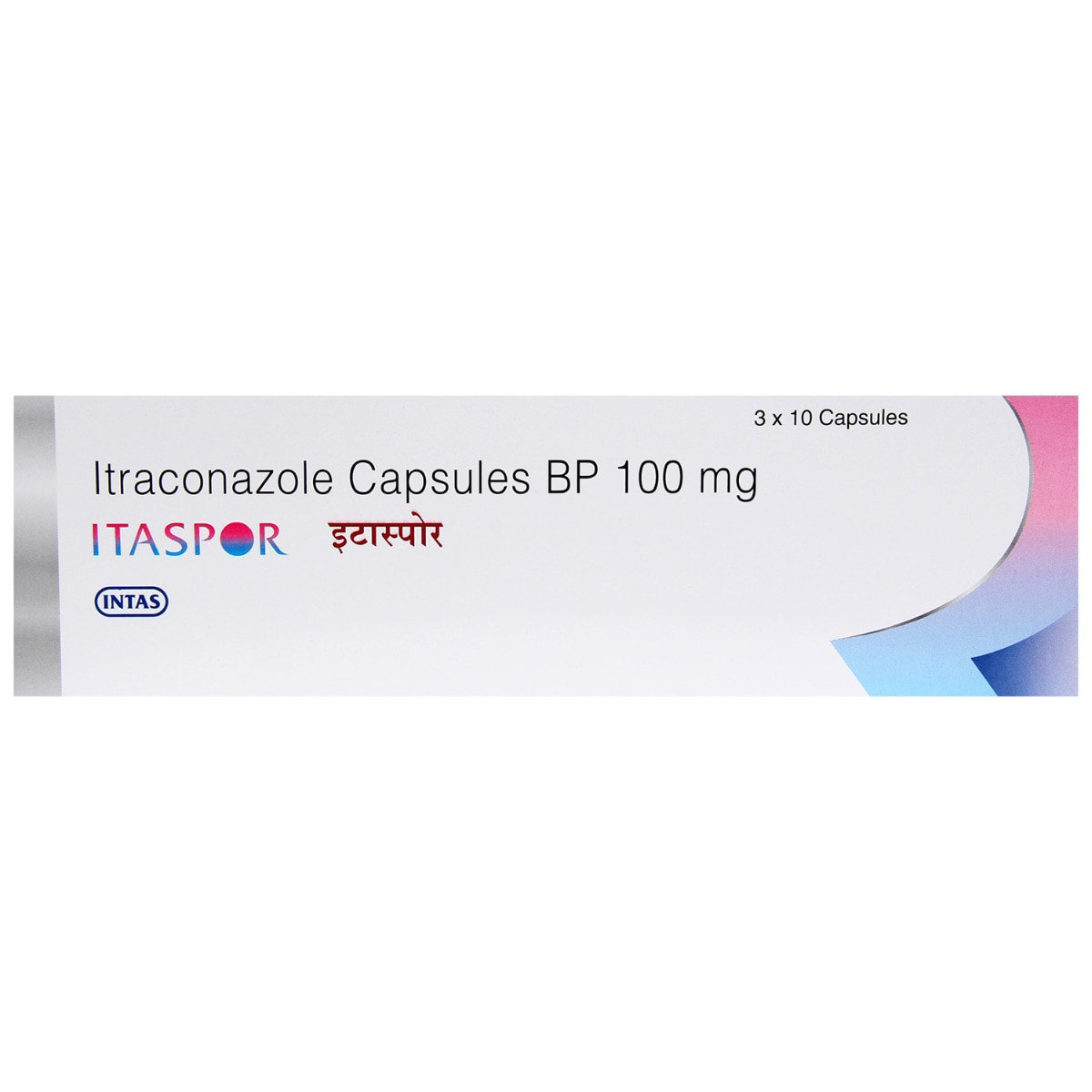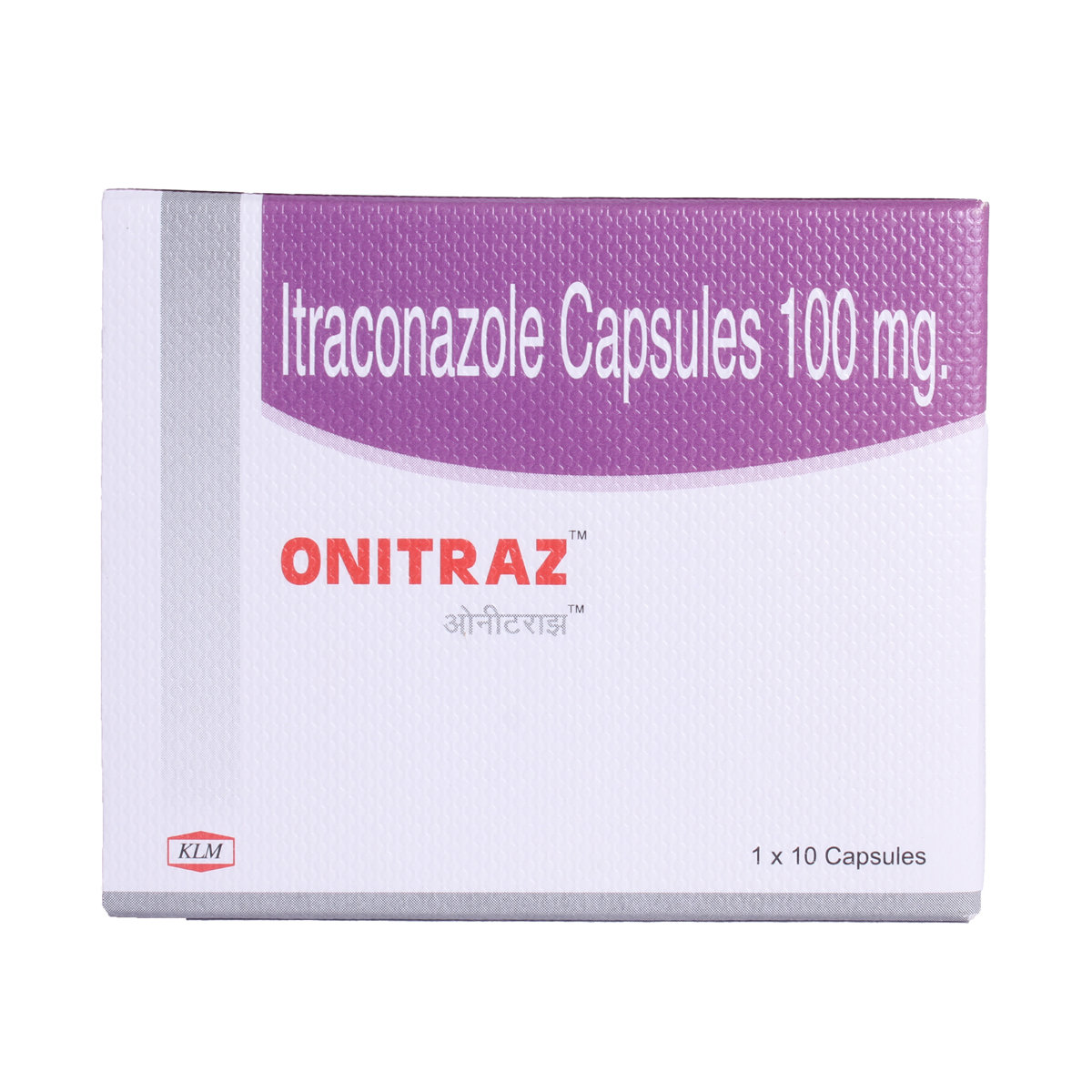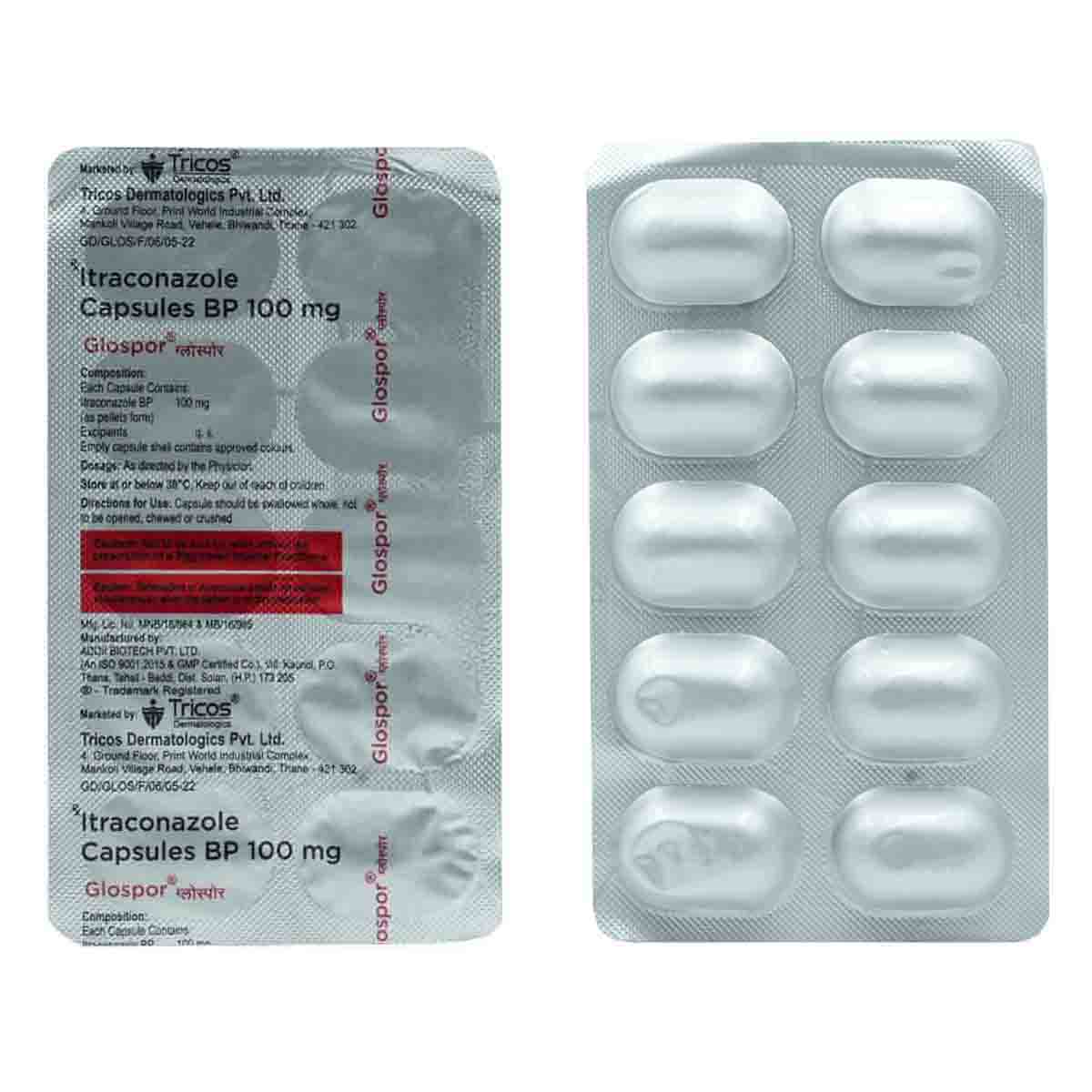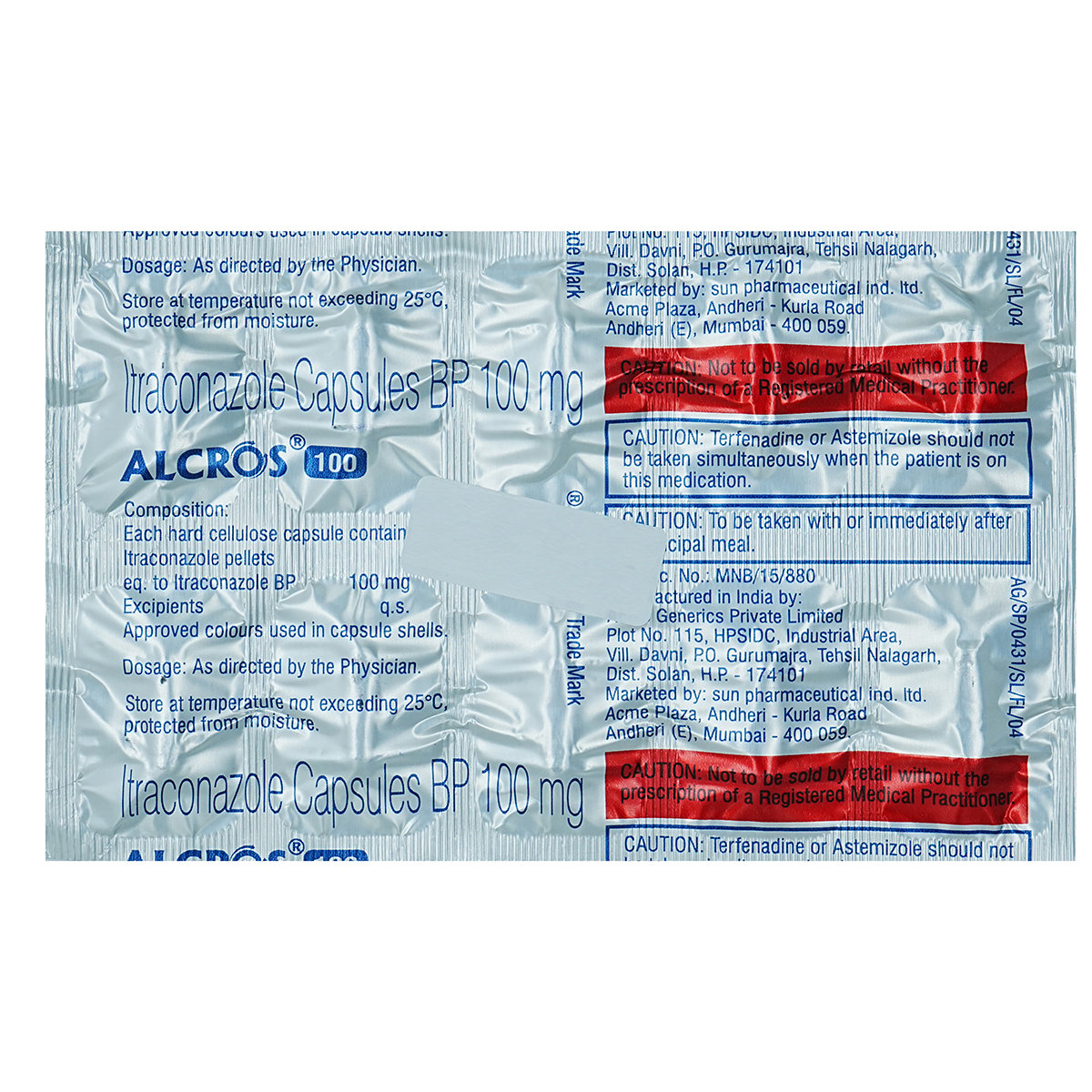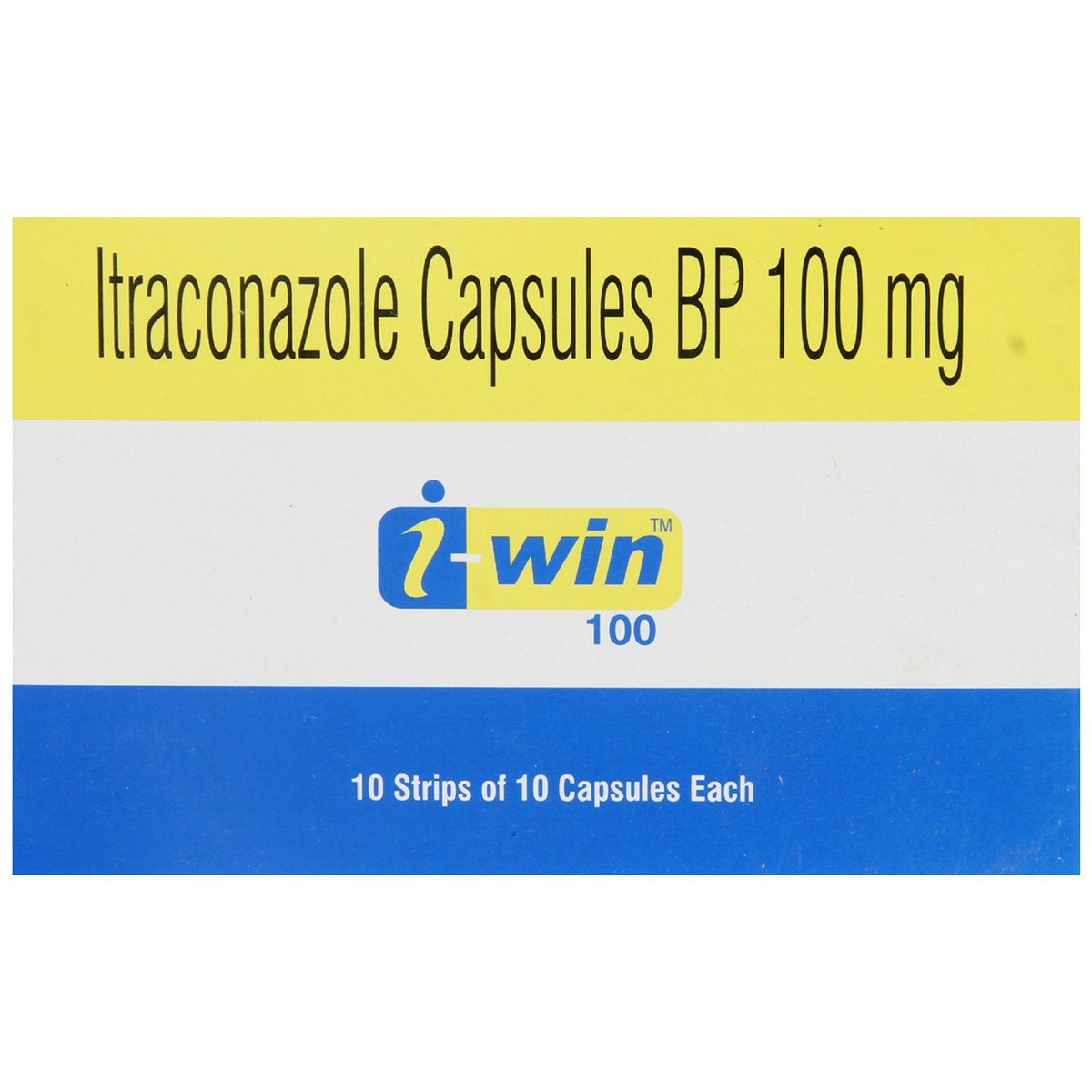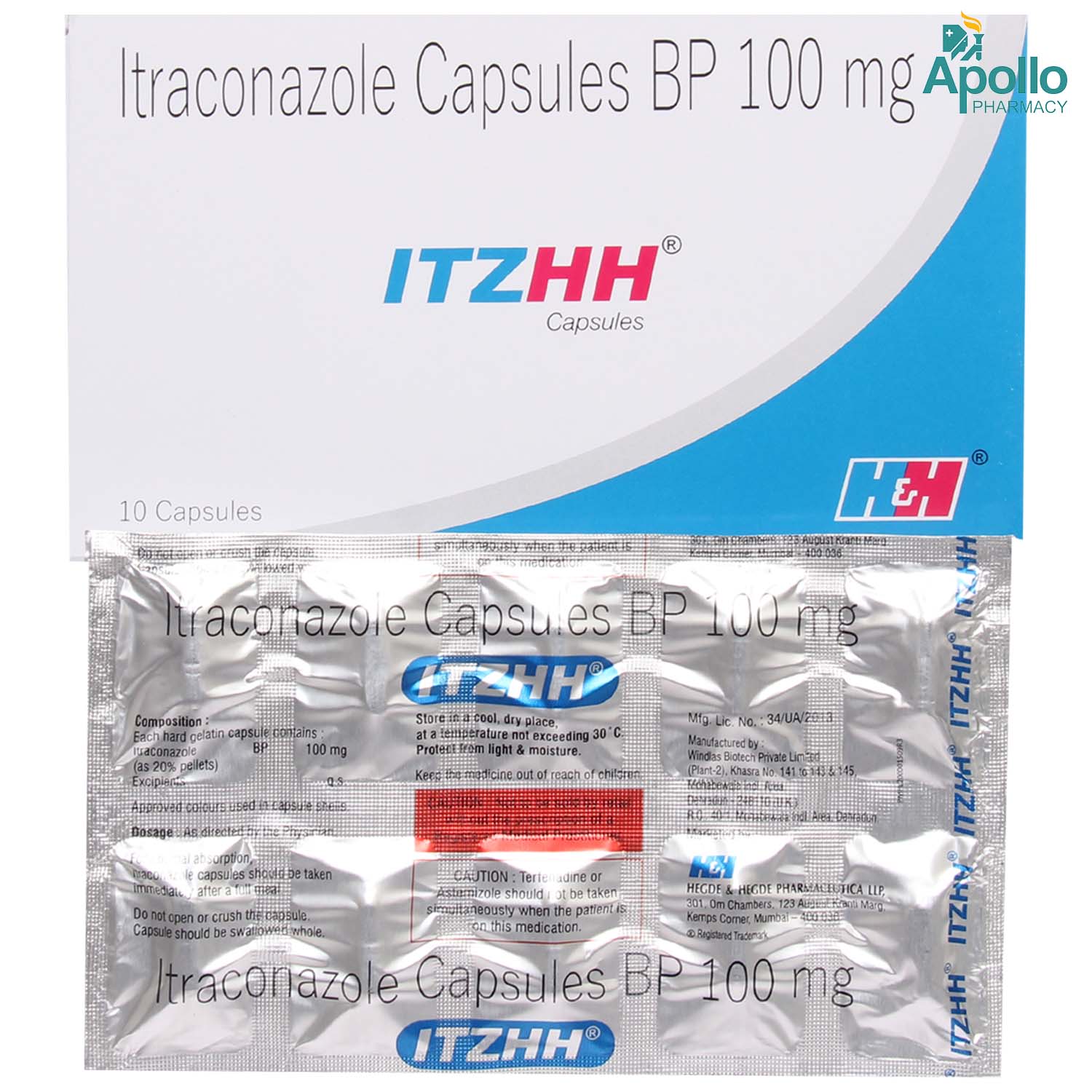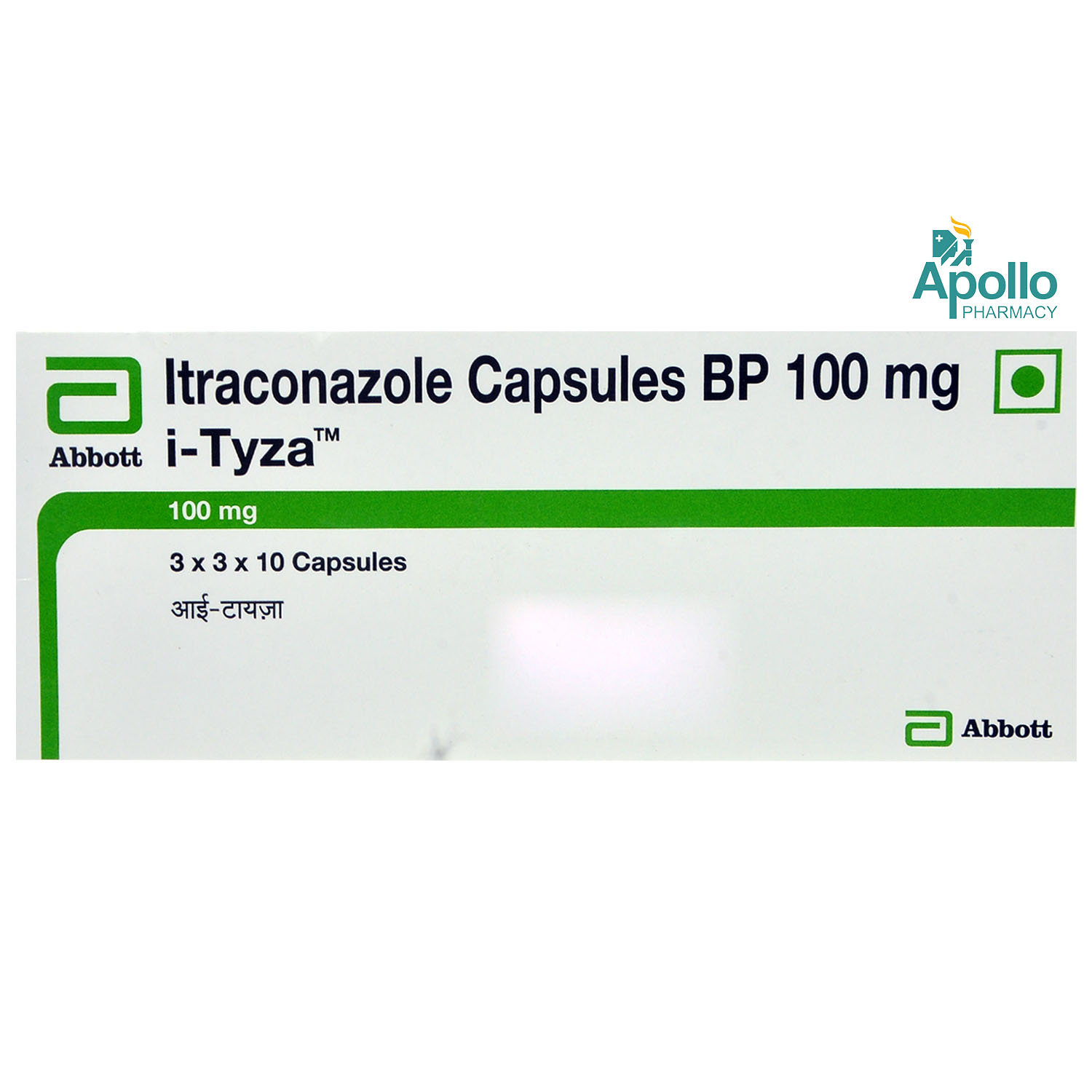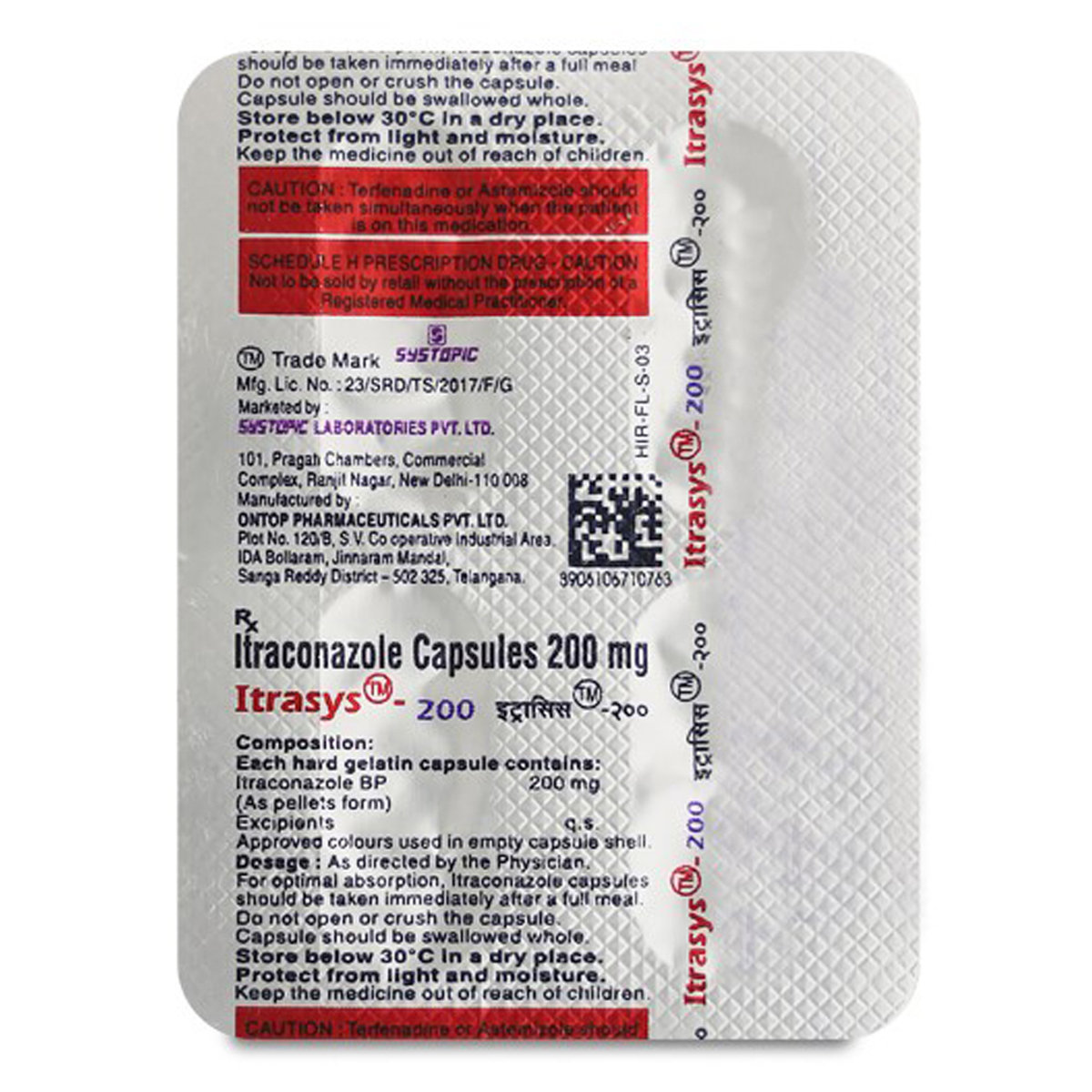Ozitral-100 mg Capsule 10's
MRP ₹127.5
(Inclusive of all Taxes)
₹19.1 Cashback (15%)
Provide Delivery Location
Online payment accepted
 Prescription drug
Prescription drugWhats That
Composition :
Manufacturer/Marketer :
Consume Type :
Expires on or after :
Return Policy :
About Ozitral-100 mg Capsule
Ozitral-100 mg Capsule belongs to a class of drugs called antifungals used to treat fungal infections of the mouth, throat, toenails, fingernails or lungs. Fungal infection is a disease in which a fungus attacks the tissue and causes infection. Fungal infections may be contagious (spread from one person to another).
Ozitral-100 mg Capsule contains Itraconazole, an antifungal that works by inhibiting the production of ergosterol (a main component of cell membranes of fungi). Thereby, weakens and damages the fungal cell membranes that are essential for their survival as they prevent the entry of unwanted substances into the cells and stop the leakage of cell contents. Thus, causes the main components of fungal cells to leak out and kill fungi and clear the fungal infection.
Take Ozitral-100 mg Capsule as prescribed. Your doctor will advise you on how often you take Ozitral-100 mg Capsule based on your medical condition. Some people may experience nausea, headache, diarrhoea, tiredness, cough, cold, throat pain, back pain and stomach pain. Most of these side effects of Ozitral-100 mg Capsule do not require medical attention and gradually resolve over time. However, if the side effects persist or worsen, please consult your doctor.
If you are known to be allergic to Ozitral-100 mg Capsule or any other medicines, please tell your doctor. Ozitral-100 mg Capsule is a pregnancy category C drug and may cause harm to the unborn baby. However, if you are pregnant, planning for pregnancy or a nursing mother, it is advised to consult a doctor before using Ozitral-100 mg Capsule . Do not take Ozitral-100 mg Capsule if you have or had heart failure as it may cause severe life-threatening adverse effects. If you have kidney, liver, heart or lung problems, inform your doctor before taking Ozitral-100 mg Capsule . Avoid taking fentanyl (a strong opioid narcotic medicine) with Ozitral-100 mg Capsule as it may cause severe breathing problems and can even lead to death. If you experience numbness or tingling in your hands or feet, stop taking Ozitral-100 mg Capsule and consult your doctor immediately as they might be symptoms of nerve damage.
Uses of Ozitral-100 mg Capsule
Directions for Use
Key Benefits
Ozitral-100 mg Capsule is an antifungal used to treat fungal infections of the mouth, throat, toenails, fingernails or lungs. The fungal cell membranes are essential for their survival as they prevent the entry of unwanted substances into the cells and stops the leakage of cell contents. Ozitral-100 mg Capsule inhibits the production of ergosterol (a main component of cell membranes of fungi). Thereby, weakens and damages the fungal cell membranes causing the main components of fungal cells to leak out. Thus, kills fungi and clears the fungal infection.
Storage
- Inform your doctor about the nausea and discuss possible alternatives to the medication or adjustments to the dosage.
- Divide your daily food intake into smaller, more frequent meals to reduce nausea.
- Opt for bland, easily digestible foods like crackers, toast, plain rice, bananas, and applesauce.
- Avoid certain foods that can trigger nausea, such as fatty, greasy, spicy, and smelly foods.
- Drink plenty of fluids, such as water, clear broth, or electrolyte-rich beverages like coconut water or sports drinks.
- Use ginger (tea, ale, or candies) to help relieve nausea.
- Get adequate rest and also avoid strenuous activities that can worsen nausea.
- Talk to your doctor about taking anti-nausea medication if your nausea is severe.
- Record when your nausea occurs, what triggers it, and what provides relief to help you identify patterns and manage your symptoms more effectively.
- Inform Your Doctor: Notify your doctor immediately about your diarrhoea symptoms. This allows them to adjust your medication or provide guidance on managing side effects.
- Stay Hydrated: Drink plenty of fluids to replace lost water and electrolytes. Choose water, clear broth, and electrolyte-rich drinks. Avoid carbonated or caffeinated beverages to effectively rehydrate your body.
- Follow a Bland Diet: Eat easy-to-digest foods to help firm up your stool and settle your stomach. Try incorporating bananas, rice, applesauce, toast, plain crackers, and boiled vegetables into your diet.
- Avoid Trigger Foods: Steer clear of foods that can worsen diarrhoea, such as spicy, fatty, or greasy foods, high-fibre foods, and dairy products (especially if you're lactose intolerant).
- Practice Good Hygiene: Maintain good hygiene to prevent the spread of infection. To stay healthy, wash your hands frequently, clean and disinfect surfaces regularly, and avoid exchanging personal belongings with others.
- Take Anti-Diarrheal Medications: If your doctor advises, anti-diarrheal medications such as loperamide might help manage diarrhoea symptoms. Always follow your doctor's directions.
- Keep track of your diarrhoea symptoms. If they don't get better or worse or are accompanied by severe stomach pain, blood, or dehydration signs (like extreme thirst or dark urine), seek medical help.
- Skin rash caused by allergies is due to irritants or allergens. Therefore, avoid contact with such irritants.
- Consult your doctor for proper medication and apply an anti-itch medication. Follow the schedule and use the medication whenever needed.
- Protect your skin from extreme heat and try to apply wet compresses.
- Soak in the cool bath, which gives a soothing impact to the affected area.
- Preventing Vomiting (Before it Happens)
- Take medication exactly as prescribed by your doctor. This can help minimize side effects, including vomiting.
- Having a small meal before taking your medication can help reduce nausea and vomiting.
- Talk to your doctor about taking anti-nausea medication along with your prescribed medication.
- Managing Vomiting (If it Happens)
- Try taking ginger in the form of tea, ale, or candy to help alleviate nausea and vomiting.
- What to Do if Vomiting Persists
- Consult your doctor if vomiting continues or worsens, consult the doctor for guidance on adjusting your medication or additional treatment.
- Reduce salt intake to minimize fluid buildup.
- Use compression stockings, sleeves, or gloves.
- Gently massage the affected area towards the heart.
- Protect the swollen area from injury and keep it clean.
- Use lotion or cream to keep the skin moisturized.
- Hydrate your body: Drink enough water to prevent dehydration and headaches.
- Calm Your Mind: Deep breathing and meditation can help you relax and relieve stress.
- Rest and Recharge: Sleep for 7-8 hours to reduce headache triggers.
- Take rest: lie down in a quiet, dark environment.
- Cold or warm compresses can help reduce tension.
- Stay Upright: Maintain good posture to keep symptoms from getting worse.
- To treat headaches naturally, try acupuncture or massage therapy.
- Over-the-counter pain relievers include acetaminophen and ibuprofen.
- Prescription Assistance: Speak with your doctor about more substantial drug alternatives.
- Severe Headaches: Seek emergency medical assistance for sudden, severe headaches.
- Frequent Headaches: If you get reoccurring headaches, consult your doctor.
- Headaches with Symptoms: Seek medical attention if your headaches include fever, disorientation, or weakness.
- Inform your doctor immediately if you experience a fever after starting a new medication.
- Your doctor may adjust your medication regimen or dosage as needed to minimize fever symptoms.
- Monitor your body temperature to monitor fever progression.
- Drink plenty of fluids, such as water or electrolyte-rich beverages, to help your body regulate temperature.
- Get plenty of rest and engage in relaxation techniques, such as deep breathing or meditation, to help manage fever symptoms.
- Under the guidance of your doctor, consider taking medication, such as acetaminophen or ibuprofen, to help reduce fever.
- If your fever is extremely high (over 103°F), or if you experience severe symptoms such as confusion, seizures, or difficulty breathing, seek immediate medical attention.
Drug Warnings
If you are known to be allergic to Ozitral-100 mg Capsule or any other medicines, please tell your doctor. Ozitral-100 mg Capsule is a pregnancy category C drug and may cause harm to the unborn baby. However, if you are pregnant, planning for pregnancy, or are a nursing mother, it is advised to consult a doctor before using Ozitral-100 mg Capsule . Avoid taking fentanyl (a strong opioid pain killer narcotic medicine) with Ozitral-100 mg Capsule , as it may cause severe breathing problems and can even lead to death. Do not take Ozitral-100 mg Capsule if you had heart failure as it may cause severe life-threatening adverse effects. If you experience a yellow colour change of your eyes or skin, dark coloured urine, stomach pain, pale stools, loss of appetite, unusual tiredness, vomiting or nausea, stop taking Ozitral-100 mg Capsule and consult a doctor immediately as they might be symptoms of liver failure. If you have kidney, liver, heart, or lung problems, inform your doctor before taking Ozitral-100 mg Capsule .
Drug-Drug Interactions
Drug-Drug Interactions
Login/Sign Up
The blood levels and effects of Isavuconazole may be significantly enhanced by taking Ozitral-100 mg Capsule along with it.
How to manage the interaction:
Co-administration of Isavuconazole and Ozitral-100 mg Capsule can lead to an interaction, it can be taken if advised by a doctor. However, if you experience any symptoms like nausea, vomiting, or diarrhoea, consult a doctor immediately. Do not stop using any medications without a doctor's advice.
The blood levels and effects of ticagrelor may be greatly increased when combined with Ozitral-100 mg Capsule.
How to manage the interaction:
Ozitral-100 mg Capsule and ticagrelor may interact, however if prescribed by a physician, they can be used together. While receiving therapy, you should consult a doctor if you develop any unusual bleeding or bruising, swelling, vomiting, blood in your urine or stools, headache, dizziness, or weakness. Without consulting a doctor, never stop taking any medication.
Co-administration of Methylergometrine and Ozitral-100 mg Capsule may increase the blood levels of Methylergometrine.
How to manage the interaction:
Methylergometrine and Ozitral-100 mg Capsule may interact, but if prescribed by a doctor, they can be used together. Do not discontinue any medications without first consulting your doctor.
Simvastatin's blood levels and effects may be greatly increased when combined with Ozitral-100 mg Capsule.
How to manage the interaction:
Simvastatin and Ozitral-100 mg Capsule may interact, but if prescribed by a doctor, they can be used together. Consult a doctor if you have side effects such unexplained pain in the muscles or tenderness, muscle weakness, fever or flu-like symptoms, or dark urine. Without consulting a doctor, never stop taking any medication.
The blood levels and effects of felodipine may be considerably increased by taking Ozitral-100 mg Capsule together with felodipine.
How to manage the interaction:
Although there is a possible interaction between felodipine and Ozitral-100 mg Capsule, they can be taken if prescribed by a doctor. Consult a physician if you have an irregular heartbeat, Edema (accumulation of fluid in hands or legs), or abnormally low blood pressure. Without first consulting a doctor, never stop taking medicines.
The blood levels and effects of ergotamine may be greatly increased when combined with Ozitral-100 mg Capsule.
How to manage the interaction:
Ergotamine and Ozitral-100 mg Capsule may interact, but if prescribed by a doctor, they can be used together. Consult a doctor if you experience a severe headache, shortness of breath, blurred vision, confusion, nausea, vomiting, numbness or tingling, muscle pain or weakness, blue or purple discoloration of the fingers or toes, pale or cold skin, or chest pain or tightness. Without first consulting your doctor, never stop taking medicines.
Co-administration of Tolvaptan and Ozitral-100 mg Capsule may significantly raise Tolvaptan blood levels and effects.
How to manage the interaction:
There may be a possibility of interaction between Tolvaptan and Ozitral-100 mg Capsule, but it can be taken if prescribed by a doctor. If you notice any of these signs -difficulty swallowing, trouble speaking, muscle weakness, trouble controlling body movements, confusion, mood changes, seizures, call a doctor right away. Do not stop using any medications without a doctor's advice.
Co-administration of Triazolam and Ozitral-100 mg Capsule may significantly increase the levels of Triazolam.
How to manage the interaction:
Although combining Triazolam and Ozitral-100 mg Capsule may possibly lead to an interaction, they can be taken if prescribed by a doctor. Consult a doctor if you get extremely drowsy and your breathing becomes slow. Without consulting a doctor, never stop taking any medication.
Alprazolam's blood levels may be significantly raised when combined with Ozitral-100 mg Capsule.
How to manage the interaction:
Although combining Alprazolam and Ozitral-100 mg Capsule may lead to an interaction, they can be taken if prescribed by a doctor. Consult a doctor if you get extremely drowsy and your breathing becomes slow. Without consulting a doctor, never stop taking any medication.
The blood levels and effects of solifenacin may be greatly increased when combined with Ozitral-100 mg Capsule.
How to manage the interaction:
Solifenacin and Ozitral-100 mg Capsule may interact, however, if recommended by a physician, they are safe to consume. Consult a doctor if you feel sleepy, or uneasy, have an irregular heartbeat, have blurry vision, have trouble urinating, have a dry mouth, a headache, have digestive problems, or have constipation. Without consulting a doctor, never stop taking any medication.
Drug-Food Interactions
Drug-Food Interactions
Login/Sign Up
Grapefruit Juice, Grapefruit
How to manage the interaction:
Consuming Grapefruit, Grapefruit juice with Ozitral-100 mg Capsule may impair the absorption of Ozitral-100 mg Capsule, resulting in decreased antifungal effects. Avoid consuming Grapefruit and grapefruit juice with Ozitral-100 mg Capsule.
Diet & Lifestyle Advise
- Regularly change your socks and wash your feet. Avoid shoes that make your feet sweaty and hot.
- In wet places such as changing rooms and gym showers, don’t walk on barefoot to prevent fungal infections.
- Do not scratch the affected area of skin as it can spread the infection to other body parts.
- Avoid sharing towels, combs, bedsheets, shoes or socks with others.
- Wash your bed sheets and towels regularly.
Side Effects of Ozitral-100 mg Capsule
- Nausea
- Headache
- Diarrhoea
- Tiredness
- Cough
- Cold
- Throat pain
- Back pain
- Stomach pain
Habit Forming
Therapeutic Class
All Substitutes & Brand Comparisons
RX
Candiforce-100 Capsule 10's
Mankind Pharma Pvt Ltd
₹135.5
(₹12.2 per unit)
6% COSTLIERRX
IT-Mac 100 Capsule 10's
Macleods Pharmaceuticals Ltd
₹138.5
(₹12.47 per unit)
8% COSTLIERRX
Itratuf Capsule 15's
Alkem Laboratories Ltd
₹217.5
(₹13.05 per unit)
13% COSTLIER
Author Details
We provide you with authentic, trustworthy and relevant information
Drug-Diseases Interactions
Drug-Diseases Interactions
Login/Sign Up
FAQs
Drug-Drug Interactions Checker List
- ESOMEPRAZOLE
- OMEPRAZOLE
- PANTOPRAZOLE
- FLUTICASONE
- BUDESONIDE
- HYDROCODONE
- WARFARIN
- SIMVASTATIN
- TERFENADINE
- ALPRAZOLAM
Special Advise
- Regular blood tests are recommended before and while taking Ozitral-100 mg Capsule to monitor liver functioning especially if you have any liver problems.
Disease/Condition Glossary
Fungal infection: It is a skin disease in which a fungus attacks the tissue and cause infection. It may be contagious (spread from one person to another). The symptoms of a fungal infection include blisters, itching, redness, scaling and swelling of the skin. Yeast infection is caused by a type of fungus called candida and commonly occurs in moist and warm areas of the body. It is not contagious. It may cause infections in the mouth (oral thrush), vagina, nails, groin or armpits.

Have a query?
Alcohol
Safe if prescribed
Avoid consumption of alcohol with Ozitral-100 mg Capsule as it may increase the risk of liver problems and other adverse effects.
Pregnancy
Consult your doctor
Ozitral-100 mg Capsule is category C pregnancy drug and is unsafe for pregnant women as it may cause harm to the unborn baby. Therefore, inform your doctor if you are pregnant or planning for pregnancy before taking Ozitral-100 mg Capsule .
Breast Feeding
Consult your doctor
Ozitral-100 mg Capsule is excreted in human milk and may harm the baby. Therefore, Ozitral-100 mg Capsule is given to breastfeeding mothers only if doctor thinks benefits are greater than risks.
Driving
Safe if prescribed
Ozitral-100 mg Capsule may cause dizziness, hearing loss, double or blurred vision in some people. Therefore, drive only if you alert after taking Ozitral-100 mg Capsule .
Liver
Consult your doctor
Take Ozitral-100 mg Capsule with caution, especially if you have a history of Liver diseases/conditions. The dose may be adjusted by your doctor as required.
Kidney
Consult your doctor
Take Ozitral-100 mg Capsule with caution, especially if you have a history of Liver diseases/conditions. The dose may be adjusted by your doctor as required.
Children
Safe if prescribed
Ozitral-100 mg Capsule is not recommended for children below 12 years as the safety and effectiveness were not established.







